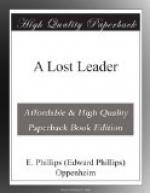“Then you may take it,” Lord Redford said, “that I should be proud to become a member of such a Government. Anything would be better than a fourth-party administration with Imperialism on the brain and rank Protection on their programme. They might do mischief which it would take centuries to undo.”
“We understand one another, Lord Redford,” Mannering said, simply. “I am very much obliged to you. This is my turning.”
Mannering, when he found himself alone in his study, drew a little sigh of relief. He flung himself into an easy-chair, and sat with his hands pressed against his temples. The events of the day, from the morning at Sandringham to his recent conversation with Lord Redford, were certainly of sufficiently exciting a nature to provide him with food for thought. And yet his mind was full of one thing only, this chance meeting with Berenice. It was wonderful to him that she should have changed so little. He himself felt that the last two years were equal to a decade, that events on the other side of that line with which his life was riven were events with which some other person was concerned, certainly not the Lawrence Mannering of to-day. And yet he knew now that the battle which he had fought was far from a final one. Her power over him was unchanged. He was face to face once more with the old problem. His life was sworn to the service of the people. He had crowded his days with thoughts and deeds and plans for them. Almost every personal luxury and pleasure had been abnegated. He had found a sort of fierce delight in the asceticism of his daily life, in the unflinching firmness with which he had barred the gates which might lead him into smoother and happier ways. To-night he was beset with a sudden fear. He rose and looked at himself in the glass. He was pale and wan. His face lacked the robust vitality of a few years ago. He was ageing fast. He was conscious of certain disquieting symptoms in the routine of his daily life. He threw himself back into the chair with a little groan. The mockery of his life of ceaseless toil seemed suddenly to spread itself out before him, a grim and unlovely jest. What if his strength should go? What if all this labour and self-denial should be in vain? He found himself growing giddy at the thought.
He rang the bell and ordered wine. Then he went to the telephone and rang up a doctor who lived near. Very soon, with coat and waistcoat off, he was going through a somewhat prolonged examination. Afterwards the doctor sat down opposite to him and accepted a cigar.
“What made you send for me this evening?” he asked, curiously.
Mannering hesitated.
“An impulse,” he said. “To-morrrow I should have no time to come to you. I wasn’t feeling quite myself, and it is possible that I may be undertaking some very important work before long.”
“I shouldn’t if I were you,” the doctor remarked, quietly.




